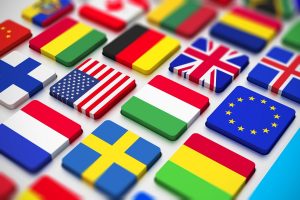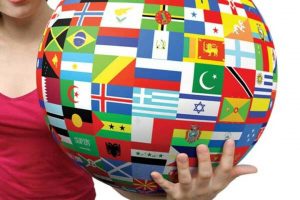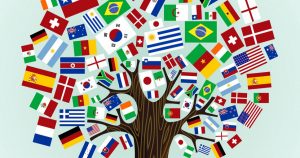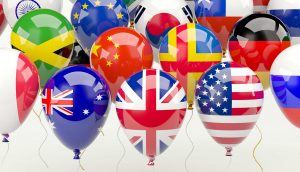We all know perfectly well the unwritten truth about how important the correct spelling of the first and last name is, one typo – and you will already be a completely different person. Probably everyone has heard about Valentina Zueva, who tearfully asked keyboard developers to move the letter “z” away from the letter “x” …
So, similar errors and misprints can occur during translations. At first glance, it may seem that the translation of proper names is one of the easiest. But it was not there. Transcriptions, transliterations, translations, adaptations – absolutely everything is possible here. For example, in Italy, all the names of great people were once adapted according to the peculiarities of their language and culture: instead of Leo Tolstoy, it turned out Leone Tolstoi, Car

l Dickens – Carlo Dickens (Carlo Dickens), Gustav Flaubert – Gustavo Flaubert (Gustavo Flaubert), Wolfgang Amadeus Mozart – VolfangoAmedeo Mozart and others.
Similar examples can be found in the translation of Russian classics into English. Tolstoy in American literary culture is better known as “Leo” (Leo), which is in no way a translation of the original “Lev” (Leo), but is considered an onomastic version, that is, an English proper name that takes its etymological roots from the Latin leo – leonis.
Similar examples are foun
d in the Western spelling of some non-Latin names. The Russian name “Dmitrij” (Dmitry) is sometimes translated as “Demeter” (Demeter), and sometimes, in English, it also adapts to the local pronunciation and it turns out Dmitri or Dmitry (because it is difficult for English speakers to pronounce two vowel sounds in a row “ij” ). The situation is similar with the name “Vasilij” (Vasily), it is easy to pronounce in both English and Italian and French with an involuntary elongated “s”. Such lengthening is sometimes even shown in the spelling in the informal texts of Vassily or Vassili. From this point of view, adaptation is more likely for the convenience of pronunciation, and not for philological accuracy.
Changed and adapted pronunciation, violation of certain philological rules is sometimes even very useful and correct. For example: everyone knows the novel “Anna Karenina”, but probably not many people know that the heroine’s surname in most Western languages will sound exactly the same as her husband’s surname – “Karenin” (Karenin). In Italian, Spanish, French, German, English surnames are not inflected by gender. If we follow these rules, and not the rules of translation adequacy, then the name of the great novel will sound “Anna Karenin” (Anna Karenin).
Let’s also try to identify
other objects that have their own names, which most often lend themselves to translations:
Names, surnames of people
Street names
Names of organizations, institutions, companies
Apart from the translation of internationally renowned organizations such as the European Union (UnioneEuropea, UnionEurop? Enne, EuropeanUnion, Europ? IscheUnion), most of the names of institutions can cause translation embarrassment. A striking example is the translation of the names of universities, which consist of the name of the city: University of California, George Washington University, University of Milan (U
niversit? DegliStudidiMilano), some universities bear the name of the place / city of foundation, while others bear the name / surname of the founder … So, the translation of the name of the University of George Washington (Washington University) as “Universit? diWashington ”(University of Washington) would be a gross mistake, since this university is located in Missouri, not Washington, and simply bears the name of the founder – George Washington. Sometimes it happens that the translations are simply ridiculous. For example, you need to translate the name of a university, which consists of the surname of the founder, and this surname is also used in speech as a word with a different meaning. And here translation confusion is possible: the name of the University of Milan “Universit? Bocconi ”(L. Bocconi University of Milan) has been translated as“ BiteUniversity ”(University of the Bite) or“ MouthfulUniversity ”(University of Cusca). This is because the Italian word “boccone” is translated into English as “bite” (to bite, bite) or “mouthful” (piece, sip). Such errors were found
on the website of the Italian government when translating the names of educational institutions that Italian ministers graduated from.
Also, an important aspect when translating proper names or realities is from which culture and from which language this word comes. After we define the above-mentioned aspect, it is necessary to decide how exactly to translate the reality or a proper name. We may have the following translation transformations at our disposal:
Transliteration or transcription of the original spelling
Translation or adaptation of the original spelling
And what should not be done in any case:
transcription or adaptation of non-original spelling
For example, take Martin Cruz Smith’s novel “Gorky Park” (MartinCruzSmith ‘GorkyPark), published in Italy with the same English title translated by Pier Francisco Paolini (who, however, had nothing to do with the title of the novel, since this role is usually played by the main publishers). The action of this American novel takes place in an amusement park in Moscow, which was originally called Gorky Park. But when writing a novel, the author decided to give the name of the park a translated English version: GorkyPark.
The editor-in-chief of the Italian publishing house could do with the title in several ways:
Transliterate or transcribe the original spelling (“ParkimeniGor? Kogo”)
translate or adapt the original spelling (“ParcoGor? kij”)
but chose a completely invalid option instead:
transcription or adaptation of non-original spelling: and so, the text was translated as “GorkyPark”, as if in New York or in another city in the United States there is such a park that bears the name of a Russian writer.
In this case, an obvious mistake was made, maybe not so much from the literary point of view, but from the point of view of design. Thus, readers have the illusion that somewhere in the world there is a “GorkyPark” (the name sounds exactly in English), and that the novel is not taking place in Russia at all.
But the matter did not end with the Italian translation of the novel; the French publisher made an even more serious mistake. So, the name was translated GorkiParc, that is, the English construction of the phrase was preserved, but at the same time the second word Park was translated as Parc, and a new hybrid was created:
Construction – English
Translation language – French
And the proper name is Russian. (here is such a vinaigrette!)
As you can see, the translation of proper names is a delicate matter. Translators need to pay attention to absolutely all aspects: etymological, cultural, social.
If circumstances turn out so that you need to translate, do not forget to tell the translator exactly how you would like your surname or company name to sound in English or another language.



